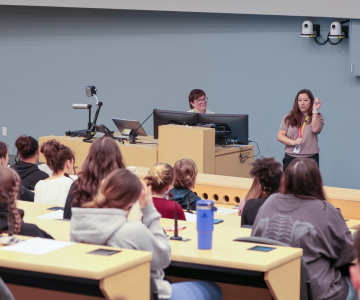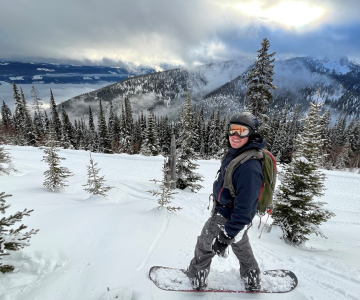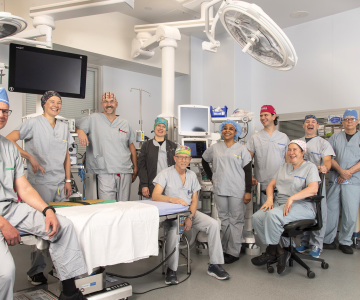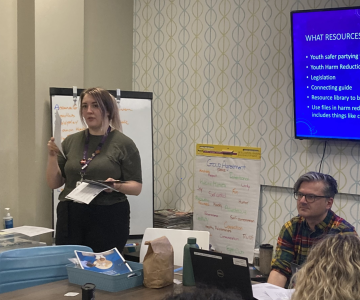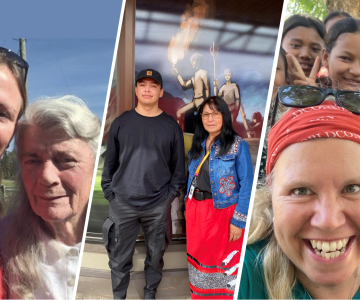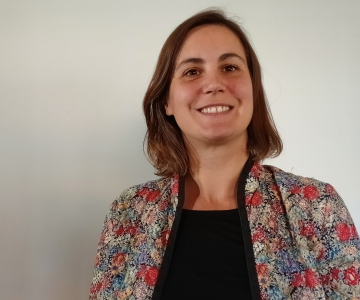Breadcrumb
Explore Stories
Community & Culture
On March 4, 2025, Kelowna General Hospital (KGH) had the privilege of hosting 115 grade 10 to 12 students from School District 23 for an exciting and informative Careers in Health Care Day. This event offered students the unique opportunity to explore the many diverse and rewarding career paths available in the health care sector.
Community & Culture
Name: Jarred Kelly (he/him)Job Title: Clinical Pharmacy Specialist – Trauma and Critical CareYears of Service: 7 Worksite: Kelowna General HospitalCommunity: Okanagan Ancestral Territory: syilxFavourite Quote / Advice to live by: “Treat others as you wish to be treated and you'll never go wrong!”
Work plans can change at a moment’s notice for clinical pharmacy specialist Jarred Kelly, who provides clinical pharmacy services for trauma, critical care and emergency patients at Kelowna General Hospital.
“That’s what inspires me—no two days are the same. There is always something different and exciting happening,” he says.
Depending on the number of patients and emergencies, such as helping to resuscitate a trauma patient, Jarred’s morning routine varies. Generally, he completes bedside rounds with the health-care team which involves reviewing patients’ medication lists for efficacy and safety, developing pharmaceutical care plans, resolving drug therapy problems and educating patients.
Community & Culture
There is a rare opportunity to work in the anesthesiology department at Royal Inland Hospital, a hospital that combines professional diversity with the chance to make a meaningful impact in patients' lives.
Discover your next chapter at Royal Inland Hospital. Welcome to "life in the Loops!"
Health & Wellness
Three years ago, if you searched online for “youth harm reduction” you wouldn’t have found much at all. This is no longer the case.
Interior Health’s (IH) Youth Harm Reduction team has been around for just under three years. But in that time, their work has become highly regarded across B.C. and Canada.
Community & Culture
In celebration of International Women’s Day, March 8, we interviewed three regional IH leaders in their fields to learn how they found passion in their roles, and how they are creating positive change for others.
Community & Culture
Name: Carnation Nonhlanhla Zhuwaki (she/her/hers)Job Title: Knowledge FacilitatorYears of Service: 4Worksite: Vernon Health UnitCommunity: VernonAncestral Territory: syilx/OkanaganFavourite Quote / Advice to live by: My favourite quote is from my mother, "Approach life with a humble and teachable spirit, because life is a wheel: sometimes you're at the top, sometimes you’re at the bottom."
Carnation Zhuwaki works for Interior Health (IH) as a knowledge coordinator based at the Vernon Health Unit. She started working at IH four years ago as an Emergency Department registered nurse and transitioned to her current role in 2021.
Carnation believes everyone has a gift and a purpose—something they are good at. “Some people are aware of it, and some need a little encouragement to own their gift,” she says. “I enjoy identifying and encouraging others to explore their gifts.” She envisions a world where every person can show up as their authentic self, be seen and feel accepted.
Health & Wellness
If you're the parent of a preteen or teen, you might be wondering why the Human papillomavirus (HPV) vaccine is so important for your child's health.
HPV is a common virus that can be spread through skin-to-skin and sexual contact. Some types of HPV cause changes in the cervix, anus, throat and other areas that can lead to cancer. Many people who have an HPV infection don’t show symptoms, which means they might unknowingly pass it on to others.
Getting the HPV vaccine is one of the best ways to protect your child from certain cancers in the future; more than 70 per cent of people who haven't been vaccinated will get an HPV infection.
“Dad, I have cancer”: A father’s plea to protect youth from HPV (Island Health)
Continue reading for more information about the HPV vaccine and why you should you make sure your child gets vaccinated.
Community & Culture
Foundations in the Interior region raise funds that support medical equipment, care needs, and innovative local initiatives in their communities. Each organization includes respected community leaders, volunteers and staff who are passionate about meeting the needs of patients and families in Interior Health. Thanks to the generosity of their supporters, we all have a stronger health system.
In this next story of our series on the incredible health-care and hospital foundations throughout our region, we interviewed Bryna Idler, executive director of Kootenay Lake Hospital Foundation (KLHF).
Community & Culture
Name: Amelie Darblade (she/her/hers)Job Title: Project Manager, Digital HealthYears of Service: 2.5Worksite: RemoteCommunity: KimberleyAncestral Territory: Ktunaxa
Amelie Darblade immigrated to Canada from France in 2015. With a one-year visa in hand, she had plans to explore a new country but didn’t know what would come next. She fell in love with B.C, the great outdoors and its ancestral lands. She discovered backcountry skiing and mountain biking, met amazing people, made great friends, and in 2022, had a daughter. She has built a family and fulfilling career.
-
Load More
Showing 108 of 805
Sign up for email updates
Receive news, alerts, public service announcements and articles right to your inbox.


